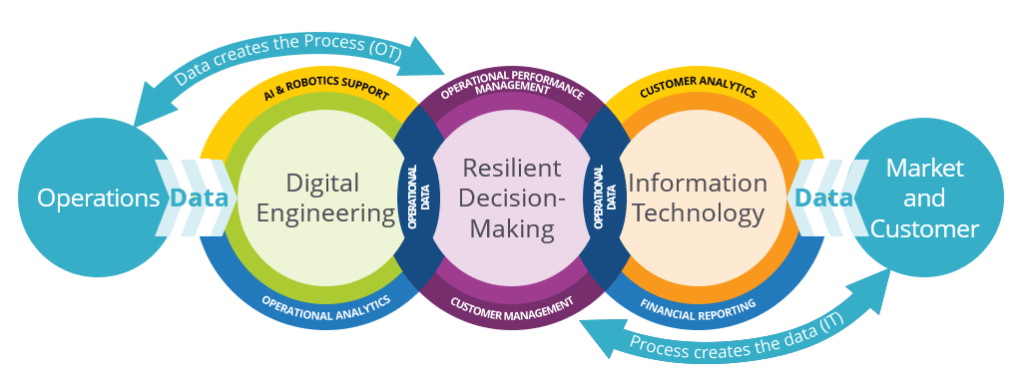The Future of Operations will require the alignment of operations to customer expectations and demands. IDC is calling organizations to become resilient decision-makers in the endeavor to meet future operation requirements. That is, they will have to pivot from an operational-driven to a market-driven mindset. IT/OT convergence can help organizations prepare to respond to the anticipated increasing expectations and demands of customers.
The Future of Operations becomes reality when companies build on their current infrastructure and digital capabilities to develop resilient decision-making. Resilient decision-making is defined as having the ability to use all available data and information to rapidly and effectively make decisions that keep your operations aligned with customer expectations and demands.
In the next 3 years, 50% of operational organizations, will have a blended organization that combines operational expertise and IT expertise.
Companies like Ford, GE Healthcare, Georgia Pacific, etc. are already using digital capabilities in a drive to build resilient operations that can shift quickly to meet market demands, global events, supplier disruptions, and other dynamic activities. According to an IDC prediction, the benefits to these resilient companies will be three-fold − By 2025, AI-powered enterprises will see 100% increase in productivity resulting in: 1/2 the response time of peers due to an ability to anticipate market and operational changes, 25% increase in success rates of new product introductions, and 1.5x higher net promoter scores than competitors due to the ability to offer a wider variety of experiences.
One of the critical aspects of the evolution to resilient decision-making is assuring all the critical data and information is ingested, contextualized, organized, and visualized for key decision makers. The core goal is the unification of the operational data stream with the data from the rest of the enterprise.
Supporting Resilient Decision-Making in the Enterprise

The converged IT/OT organization that supports resilient decision making for operations is becoming what IDC calls digital engineering (DE). The mission for DE is to use both operational knowledge and technology skills to manage the industrial digital framework for ingesting operational data, providing analytical insights to operations, supporting resilient decision-making, and delivering automation for the market-driven operation.
In the Future of Operations, as organizations move to a completely converged IT and OT organization that supports operations, we see how resilience becomes a core principle of the converged organization.
Digital Engineering Responsibilities
The digital engineering organization has some specific responsibilities that differentiate it from pure IT and OT functions:
- Analytical and AI modeling support, development and life-cycle management, including digital twins
- Data stream and ingestion manager for operational performance management system
- Arbiter of operational semantics, tags, and frameworks
- Digital project manager and ecosystem manager
- Continuous improvement and production help desk
- Production edge architecture development and IoT support
In short, DE is responsible for making sure data and systems are available to support resilient decision making, whether that decision making is done by humans or an AI system.
One of the important things to consider in the Future of Operations is that companies aren’t abandoning continuous improvement. Continuous improvement programs have a critical role to play in the Future of Operations.
Enterprise decision makers and technology suppliers will be able to understand the full scope of what’s required of them in the Future of Operations and what a fully transformed operations organization looks like, by reading the published framework document, which you can learn more about below.




